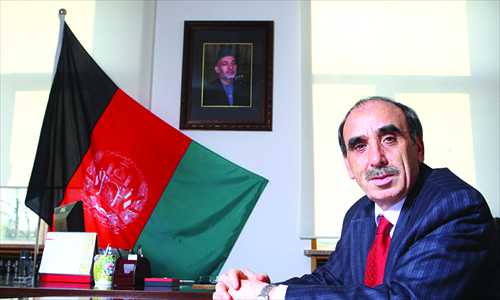Afghanistan no playground for great powers

Sultan A. Baheen
Editor's Note:
Next year sees the withdrawal of US and NATO troops from Afghanistan, drawing global attention amid uncertainty about the country's future. Can Afghanistan and the US come to an agreement on US security provision post-2014? How does the Afghan government see the country's post-2014 prospects? What can China's role be in Afghanistan's peace process? Global Times (GT) reporter Wang Wenwen talked to Sultan A. Baheen (Baheen), former Afghan ambassador to China and currently in charge of China, Russia, and Central Asia affairs at the Afghan Ministry of Foreign Affairs, on these issues.
GT: Afghanistan is talking with the US on the number of troops the US envisions leaving in Afghanistan. What is the preferred number for Afghanistan?
Baheen: We have not concluded the discussion about a security agreement. We hope we will conclude it in five weeks. An exact number of troops has not yet been decided. We need a number of US elements engaged in the training of Afghan forces and, if there is need for it, in fighting against terrorist forces.
The agreement should meet the interest of both sides, and provide financial support, training, and equipment for the Afghan forces. This is more important than any speculation about the agreement.
GT: Strategists believe that as the prospects of Afghanistan remain unclear, it will become a testing field where all players display their geopolitical interests. What's your view?
Baheen: First of all, I would like to say that I am positive about the future of Afghanistan after 2014.
Recently, for the first time in history, Afghanistan won the South Asian Football Federation Cup. We defeated India. It was celebrated like a festival all over the country, regardless of which ethnic group people belonged to or what language they spoke. This is a sign of positive change and growing confidence.
I believe few foreign media outlets reported this news. I did not see it covered on the CNN or the BBC. But, if there is a road explosion, you can see hundreds of reports in the media. The majority of Afghans are dedicated to development, peace and stability.
Every country has its legitimate interests in its region and in the world. We recognize the legitimacy, interests, and concerns of all neighboring countries and stakeholders. We invite all of them to join us in a process aimed at regional peace and stability.
Afghanistan should not be a playing ground for geopolitical competition; it should be a ground for cooperation. Other countries may compete with each other, but not with the aim of destabilizing Afghanistan.
The US, China, Russia and Central Asia have their own interests, agendas as well as responsibilities. When a country is a superpower, this means not only rights but also responsibilities. It is the responsibility of all these countries not to revive the Afghanistan of 1979-2002 when the country was marked by turmoil.
Afghanistan is in a unique geopolitical position, serving as a bridge in Asia. It is trying to make a balanced relation with all of the aforementioned stakeholders. They should recognize the fact that instability in Afghanistan is not in their interest. That is why the foreign policy of our government is to cooperate with all big powers and all stakeholders.
GT: Experts believe China can play a constructive role in assisting Afghanistan in the post-2014 scenario. What are Afghanistan's expectations toward China in this regard?
Baheen: We are grateful that China continues to respect and support Afghanistan's independence, sovereignty and territorial integrity. It is important that China supports Afghanistan and our neighbors to build trust and promote cooperation.
With the clout that China has, it can also contribute more to the training of Afghan forces. Some of our national forces, especially police forces, are trained in China, roughly 50 people every year.
Given the strategic partnership between China and Afghanistan, we would expect a larger number of trainees to be hosted by China. Last year, we discussed increasing the number of trainees during our defense minister's visit to China and we received a positive answer from Beijing.
At the same time, China's economic growth needs more natural resources. China is welcome to extract our resources and invest in Afghanistan. Currently, China only has two projects in Afghanistan and there is ample space for more.
Afghan President Hamid Karzai invites more Chinese investment and assures China that Afghanistan is safe; the government will provide all required security for Chinese investment and personnel.
GT: Afghanistan will hold presidential elections next year, which is considered crucial for the future of the country. What are the challenges for the new government? Will the Taliban be part of the new government?
Baheen: The current government is laying the ground for a fair and transparent election that meets Afghan standards, not international standards.
In mature democracies the standard is very high, but we are new and inexperienced in this regard. The registration of candidates has already started. It is up to the people of Afghanistan to choose their leaders. One thing is clear; the new leader of Afghanistan will abide the continuation of current processes and the constitution of Afghanistan.
If the Taliban wishes, they could be part of the new government, provided they accept the constitution of Afghanistan and respect human rights and women's rights. If they meet these constitutional requirements, they can participate, introduce their policies in the elections, and have Afghan civil society decide on their role.